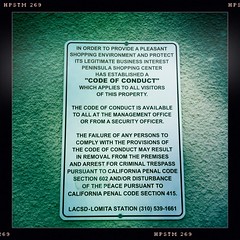
Recently I’ve been working with a client on a project that involves codes of conduct, and I’ve reviewed a number of such codes within a specific industry. A “code of conduct” is a set of rules or proper practices that regulates behaviour within an organization. Many large businesses and organizations have codes of conduct, as do armies, street gangs, criminal conspiracies, and groups of professionals. Even pirate ships, often a byword for lawlessness, had codes of conduct to regulate discipline, division of spoils and compensation for the injured.
Here are some of the things I have found about crafting an effective code of conduct, no matter what kind of behaviour or organization is to be regulated:
Purpose: It is worth spending some time thinking about why you need a code of conduct before starting to write. What kinds of activities need to be regulated and why? What values do you want to promote? What kinds of practices do you want to discourage?
Content: The most effective codes I have seen contain both abstract language about values and some clear, concrete guidelines. It is fine to say something along the lines of: “Members of the organization will be honest and scrupulous in financial dealings.” But you might also want to say, “Employees will neither accept nor offer bribes.”
Scope: Don’t try to be exhaustive. The idea is not to regulate every aspect of an individual’s life, or even every aspect of working life. Focus on what you believe is most important.
Consult: Talk to the people who will be using the code. What kinds of ethical challenges do they face? Which work-related situations do they find most troubling? If the code is to be effective it has to be relevant to the experiences of those who are expected to abide by it.
Length: If you want the code to be a document that people refer to and consult on a regular basis, it should not be too long or complex. A good length to aim for is one page, maximum.
Style: I’ve seen several codes of conduct that were all too obviously written by lawyers. While it is a good idea to have a code vetted by a lawyer, it should not require a law degree to understand it.
Keep it current: As your organization develops and grows, members will face new challenges. And technological advances bring their own ethical challenges. Ten years ago, no one needed a company policy about employees’ Twitter activity. Today, it might be quite relevant. Be sure to review and update your code of conduct periodically.
No comments:
Post a Comment